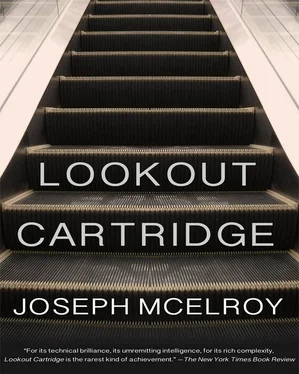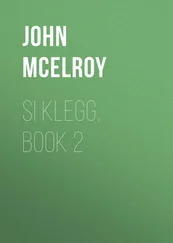Joseph McElroy - Lookout Cartridge
Здесь есть возможность читать онлайн «Joseph McElroy - Lookout Cartridge» весь текст электронной книги совершенно бесплатно (целиком полную версию без сокращений). В некоторых случаях можно слушать аудио, скачать через торрент в формате fb2 и присутствует краткое содержание. Год выпуска: 2014, ISBN: 2014, Издательство: Dzanc Books, Жанр: Современная проза, на английском языке. Описание произведения, (предисловие) а так же отзывы посетителей доступны на портале библиотеки ЛибКат.
- Название:Lookout Cartridge
- Автор:
- Издательство:Dzanc Books
- Жанр:
- Год:2014
- ISBN:9781941088036
- Рейтинг книги:3 / 5. Голосов: 1
-
Избранное:Добавить в избранное
- Отзывы:
-
Ваша оценка:
- 60
- 1
- 2
- 3
- 4
- 5
Lookout Cartridge: краткое содержание, описание и аннотация
Предлагаем к чтению аннотацию, описание, краткое содержание или предисловие (зависит от того, что написал сам автор книги «Lookout Cartridge»). Если вы не нашли необходимую информацию о книге — напишите в комментариях, мы постараемся отыскать её.
Lookout Cartridge — читать онлайн бесплатно полную книгу (весь текст) целиком
Ниже представлен текст книги, разбитый по страницам. Система сохранения места последней прочитанной страницы, позволяет с удобством читать онлайн бесплатно книгу «Lookout Cartridge», без необходимости каждый раз заново искать на чём Вы остановились. Поставьте закладку, и сможете в любой момент перейти на страницу, на которой закончили чтение.
Интервал:
Закладка:
I simply hung up.
If Lorna could play a game like that with her son, she was capable of having unknown traffic with the Druid. But Tessa was here somewhere too, having coffee with Gene’s wife and, I was willing to bet, recommending Lorna to the Druid. I hadn’t asked where Tessa was.
Yet was Lorna in danger the nature of which she’d disguised to Will as the possible reappearance of our burglar?
Why did I think of the Indian? If he’d broken into Dagger’s place, he might have broken into ours. There were photo chemicals at Dagger’s that might blow a hole in a wall.
Now that would be something to write home about to the City of Violence the London papers relied on so much that if New York were to suffer overnight some pacification plan Fleet Street would have to go out into Birnam Wood and catch a couple of hell’s maidens sacrificing a Druid on a stump.
I hadn’t the right change to phone home. I wanted to know where Lorna was. I needed that Number 12 map of the Islands of Lewis and Harris, in the Outer Hebrides. It occurred to me I could use a camera where I was going. I went through my wallet wondering if Monty Graf had been the New York call to Dudley Allott.
My phone rang — my operator or Dudley.
If Dudley, then with the help of the operator.
Perhaps Tessa. Perhaps Red Whitehead whose much reiterated “spectrum” of sales techniques I’d always taken with a grain of salt.
I pushed open the glass door.
I left the booth as the ring came again. A girl noticed.
I found a bookshop in Buchanan Street before closing. The map cost almost a dollar.
With a credit card and a little American warmth and tourist frankness I charged the following: two pairs of bluejeans, a dark green nylon rucksack like Lorna’s and mine that was collapsed on top of some old blankets on the top shelf of a closet in Highgate, the aluminum frame for the rucksack, a pair of weatherproof leather boots on the heavy side, an olive green parka like Reid’s hooded against the Hebridean rains (though I like the weather on my head), and a compass with a shock-proof window rimmed round with bright steel.
Leaving the name of my hotel with BEA, I charged a plane ticket to Stornoway for the following day; the only plausible alternative to this would have been a train to one of three points, then train and steamer or both over varying distances to reach that Calvinist town which at a latitude up above 58 degrees in October is turning down toward the dark period of its year. To wait a night and a morning in Glasgow and then fly would get me there sooner.
I unfolded my one-inch map on a hotel bed.
To get the same overhead feel as in Will’s room I pulled the map off onto the carpeted floor and knelt above it.
I hung my right hand from my wrist, elbow, and forearm, and let it go where it was drawn. Stornoway was off the map to the right. Most of Lewis shown on the map was swamped by the irregular perforations of hundreds of tiny lochs which in spots made the terrain look like a ragged sponge.
Jenny’s pencil had circled a headland labeled (yes) Callanish, evidently the village contained in the headland which was itself an oval about a mile by half a mile; it extended like a button into the landward end of East Loch Roag which was a sort of Atlantic fjord. Across the lower part of the headland below the name Callanish was the label Standing Stones . I knew the name Callanish from somewhere; I roamed outward from it in all directions sensing I could recall it if I could half-mislay it in the corner of my eye. I had to keep moving forward toward the Hebrides and the Island of Lewis and that headland and Jenny and the danger she was in — but through that danger as if it were the entry to a new circuit to Paul. The names in that field of blue waters and white land lined with fine brown elevation contours like sinuously targeted or swelling islands might give an unsuspecting imagination Gaelic sorcery and old giants. My eye circled out from Callanish, past Loch na Gainmhich, Garynahine, Grimersta, Ben Drovinish, Loch Chulain, Feath Loch Gleaharan — eminence or brackish lake or hamlet whose syllables in print one had in one’s possession without needing to say out loud correctly. But the heroes and wizards sleep in the tangled damp maxicoats of black-face Hebridean sheep. And if the outlying poor in their tiny holdings called crofts seem less poor tomorrow when I trudge among them because they live in this landscape, they seem also more poor because there is before my experienced tourist eyes almost nothing, a few sheep, endlessly a few, no goats, rarely a cow, and over the rolling moor shallow-dug trenches of peat peeled out square by square, but no longer at this time of year propped against each other drying (so if you couldn’t describe what you know to be the fact but wished to show it on film, you’d have to come back next year with your Beaulieu early enough to see those stacks and wigwams and card-houses before the men who took a comradely day from work to dig them came back to haul them home to burn on the grate).
Think of a revolution here in the northmost part of the Outer Hebrides.
What would you claim? How would you oppose London? Would you trap a tourist or two in the mountains to the south where Lewis becomes Harris? It doesn’t happen. This isn’t Corsica (where it doesn’t happen any more either). True, the young leave for the mainland, for Glasgow and Liverpool and Manchester and London, and for America. But brigands in the Hebrides there never were; instead, some contentment, of privacy, of God-ruled small families, an island self-possession at which some nasty old lowland Scot may look across the water and call degenerate interbreeding — look at all those blue-eyed black-haired square-faced ruddy Celts, don’t tell me they’re Scots.
My eye (between places, between events) on the floor of a chilly hotel bedroom orbits Callanish and the Standing Stones that I now recall are well known; my eye turns about the circle my daughter made on that other map Will and I studied and Jenny took away when she went north with Reid; revolves below and above, bearing also only forward I hope not back into dragging average errors and the auras of nostalgia and weights of adolescent origins, the dull melancholy puzzles of those ancient mistakes that may profitably be left to mature in their time capsules and that if you wish can give you an average anchor on which to swing with the average yearly wind and current tethered. But it was now — as my stomach rumbled with hunger for the future blood of those who’d ruined my film and involved my daughter — that my eye circuiting stopped on Loch Cliasam Creag, the middle word doubtless kin to Clisham, Mount Clisham, a name I had last uttered in America which my Druid says is the future where things happen first — uttered across a restaurant table to Monty Graf, a businessman I could not trust, and with John, the man in steel-rimmed specs, somewhere behind — Mount Clisham I had said, in turn recalling words taped in the Unplaced Room — Mount Clisham as my blood-shot eye fell south on my Ordnance Survey to long Loch Langavat (a Great Lake on this one-inch map) and below to my left to the Forest of Harris (the Hebrides are nearly treeless), down then to the right to the rugged heights of North Harris so crammed with fine contours that this flatly mazelike legend of steepnesses was a fingerprint-life to be read by an infrared ranger — and at the center of one of these softened Chinese boxes I read 2622 Clisham and wondering if in that future America Monty Graf had been Dudley’s caller from New York today, I recalled saying to Monty over my bluefish and his gin and milk that our deserter had shipped on a dilettante rock-hunter’s yacht to the Faeroes and had made it to the Hebrides with a fisherman and for a time lived in a hut near Mount Clisham — my very words not a week ago recollecting a bare depictured room Dagger had borrowed from some friend — an old fellow-alumnus from Berkeley? — for what had then — on Monday, May 24—been our second scene, though, like an island he and I had forked either side of, one thing to me but another to him to judge from his May 24 letter to Claire which Aut had read by now and which could cost Claire her job if she weren’t packing it in in any case. The future of that letter hard to see. It could have more than one. Someone came down the hotel hall and stopped at my door. I stood up and stepped on the map which crackled. I looked away from the door past the open wardrobe where nothing hung but two hangers, one from the other — across the double bed to the night table where the phone was: there was a phone. The steps had not moved on.
Читать дальшеИнтервал:
Закладка:
Похожие книги на «Lookout Cartridge»
Представляем Вашему вниманию похожие книги на «Lookout Cartridge» списком для выбора. Мы отобрали схожую по названию и смыслу литературу в надежде предоставить читателям больше вариантов отыскать новые, интересные, ещё непрочитанные произведения.
Обсуждение, отзывы о книге «Lookout Cartridge» и просто собственные мнения читателей. Оставьте ваши комментарии, напишите, что Вы думаете о произведении, его смысле или главных героях. Укажите что конкретно понравилось, а что нет, и почему Вы так считаете.












